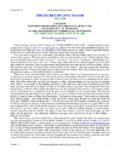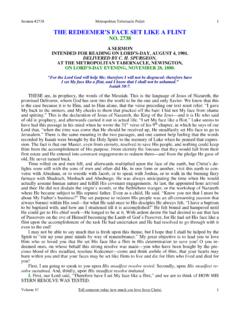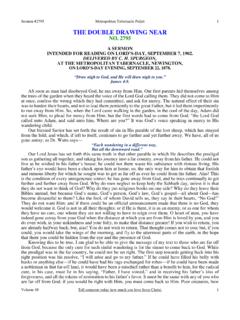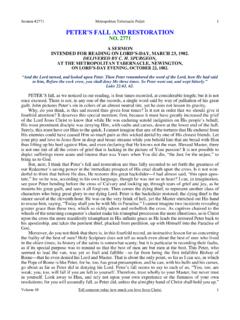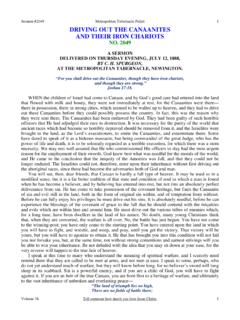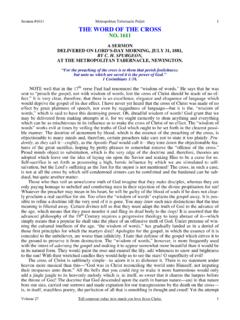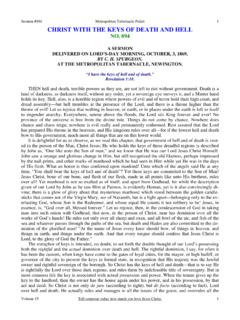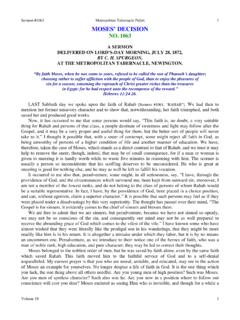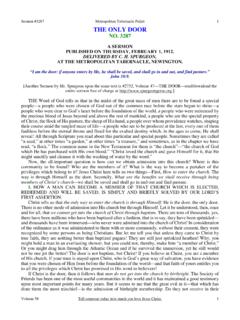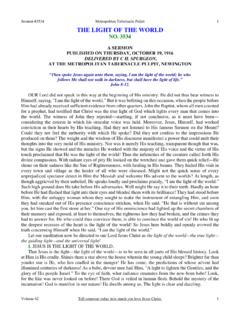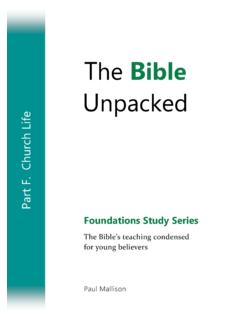Transcription of #3150 - 'Never, No Never, No Never' - Spurgeon Gems
1 Sermon #3150 Metropolitan Tabernacle Pulpit 1. never , NO never , NO never . NO. 3150. A SERMON. PUBLISHED ON THURSDAY, JUNE 24, 1909, DELIVERED BY C. H. Spurgeon , AT THE METROPOLITAN TABERNACLE, NEWINGTON, ON LORD'S-DAY EVENING, MARCH 16, 1873. Let your conversation be without covetousness: and be content with such things as you have. For He has said, I will never leave you, nor forsake you. So that we may boldly say, The Lord is my helper, and I will not fear what man shall do unto me.. Hebrews 13:5, 6. [Other Sermons by Mr. Spurgeon upon the whole or parts of these two verses, are as follows Sermons #477, Volume 8 never !]
2 never ! never ! never ! never ! #1449, Volume 24 A VILE WEED AND A FAIR FLOWER. and #1880, Volume 32 A LESSON AND A FORTUNE FOR CHRISTIAN MEN OF BUSINESS . Read/download the entire sermons, free of charge, at ]. WHEN the Lord foretold, through the mouth of His servant, the Prophet Isaiah, that He would make unto all people a feast of fat things, a feast of wines on the lees, of fat things full of marrow, . surely He must have had in His mind such precious truths of God as this one which we have in our text, I will never leave you, nor forsake you. This is the very essence of consolation! I might truly say that it is the quintessence of delight!
3 Here is solid spiritual food condensed into a very small space. Take these eight words and extract the marrow from them, or treat them as a honeycomb and get the sweet- ness out of them into your soul and it will be full of content, no, more it will be overflowing with sacred delight! I will never leave you, nor forsake you.. I. With such a text before us, we need no further preface, so we will at once begin our meditation upon the text. And first, I will ask you to VIEW THESE WORDS AS A QUOTATION. You observe that the apostle writes, He has said, I will never leave you, nor forsake you, from which it plainly appears that Paul was quoting from Holy Writ.
4 This should teach us how necessary it is for us, also, to quote Scripture whenever we can. The Holy Spirit abounds in gracious thoughts and in fitting language in which to express those thoughts, so He has no need to make extracts from what He has previously said. Yet He pleases to do so. Instead of giving us a new promise, He here gives us an old one over again, as if to remind us that there are no better things in the world than the Word of God, Himself, and that the very noblest expressions are those which have been already used! Besides, the Holy Spirit here puts honor upon the Old Testament by quoting from it for the consola- tion of New Testament believers .
5 There are some persons who seem to think more of the New Testa- ment than they do of the Old Testament. I have met with Christians in Germany with whom it has been quite a superstition that the evangelists were superior to the apostles and that the apostles were superior to the prophets. I trust that such notions as those will never spread among us! We see here that when an apostle writes as an inspired man, he quotes from the Pentateuch, he quotes from the Chronicles and he quotes from the prophecy of Isaiah so that we are to honor the Old Testament and not to look upon it as a secondary book compared with the New Testament, but to reverence the divine teaching in both portions of the inspired word.
6 In addition to that, the Holy Spirit bids Paul apply this Old Testament promise to us to show us that the Words of God spoken to saints in the ancient times were spoken also to us, so that if the Lord gave a promise to Jacob, it was not meant to be restricted to Jacob, but to belong to all those who, like Jacob, can wrestle in prayer! And that if God spoke, as He did, a promise to Joshua, it was not intended to be only for Joshua, but for all who were in like circumstances to his. Scripture promises have, all of them, a Volume 55 Tell someone today how much you love Jesus Christ. 1. 2 never , No never , No never Sermon #3150.
7 Message to all believers and if you believe in Jesus Christ what God has said to other believers of old He says this day to you! I think we may learn much from the fact that this promise is a quotation from the Old Testament. Where did Paul find it? It is not very easy to say, because it occurs in various places and the apostle has not quoted it literally. He has given the sense rather than the exact words of the quotation. He may have quoted the Septuagint version rather than the Hebrew, for no doubt he was familiar with both. There is not any one text in the Old Testament of which you could positively say that it is the one he intended, but there are several passages, any one of which you might say, The words are almost here, and the spirit and meaning of the passage are entirely here.
8 One of the first passages which Paul may be supposed to have quoted is Genesis 28:15. The fugitive Jacob lies asleep, with a stone for his pillow. In his dream, he sees a ladder reaching from earth to heav- en. At the top of it stands the Almighty, who makes a covenant with him and among the other cove- nant promises is this, Behold, I am with you, and will keep you in all places where you go, and will bring you again into this land; for I will not leave you until I have done that which I have spoken to you of. Here you get the words, I will not leave you. Does not that passage, in its proper connection, sug- gest that the promise is very applicable to young people starting out in life?
9 Jacob was leaving his fa- ther's house under very unfavorable circumstance and he was going to a distant country where he had relatives, but strangers might have been kinder to him than Laban was, for he got all he could out of him and gave him as little in return as he could! So Jacob, starting for Padanaram, gets this promise from God, I will not leave you.. I can conceive of that promise coming to some young friend here. You have committed yourself to God's keeping. You are a believer in the Lord Jesus Christ and now you are about to start on a new ca- reer. Some measure of trembling comes over you and you have been breathing this prayer to God, O.
10 Lord, lead me in the way in which You would have me go guide me in all my untrodden way. It is just possible that you are going to a distant land and you are a lover of your home, as Jacob was, and you feel some natural anxiety concerning the change that you are about to make. Here comes in the promise that is just suited to your case, I will not leave you. Jacob proved the truth of that promise. Although he had many trials, which were, most of them, of his own making, yet never was he deserted by his God! In his old age, he said, All these things are against me, but he was not speaking the truth when he said that, for even then everything was working for his good!
